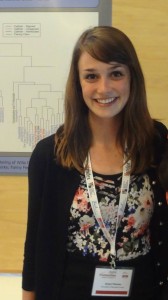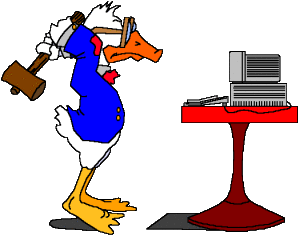For this post, I am joined by a fellow student in Indiana University’s Information and Library Science Department, Sam Ott! Sam is a first year student, also working toward a dual-degree Master of Library Science and Master of Information Science, who has over three years of experience working in paraprofessional positions in multiple public libraries. Sam and I are taking the same core classes, but he is focusing his studies on public libraries instead of my own focus on academic and research libraries. With these distinct end goals in mind, we wanted to write about how the technologies we are learning in library school are helping cultivate our skills in preparation for future jobs.
Grace

On the academic library track, much of the technology training seems to be abstract and theory based, paired with practical training. There is a push for students to learn digital encoding practices, such as TEI/XML, and to understand how these concepts function within a digital library/archive. Website architecture and development also appear as core classes and electives as ways to complement theoretical classes.
Specializations offer a chance to delve deeper into the theory and practice of one of these aspects, for example, Digital Libraries, Information Architecture, and Data Science. The student chapter of the Association for Information Science and Technology (ASIS&T) offers workshops through UITS, in addition to the courses offered, to introduce and hone UNIX, XML/XSLT, and web portfolio development skills.
Sam

On the public library track, the technology training is limited to two core courses (Representation and Organization, plus one chosen technology requirement) and electives. While most of the coursework for public libraries is geared toward learning how to serve multiple demographics, studying Information Architecture can allow for greater exposure to relevant technologies. However, the student’s schedule is filled by the former, with less time for technological courses.
One reason I chose to pursue the Master of Information Science, was to bridge what I saw as a gap in technology preparation for public library careers. The MIS has been extremely helpful in allowing me to learn best practices for system design and how people interact with websites and computers. However, these classes are still geared toward the skills needed for an academic librarian or industry employee, and lack the everyday technology skills a public librarian may need, especially if there isn’t an IT department available.
Ideas
We’ve considered a few options of courses and workshops which could provide a hands-on approach to daily technology use in any library. Since many academic librarians focused in digital tools still staff the reference desk and interact with patrons, this information is vital for library students moving on to jobs. We imagine a course or workshop series that introduces students to common issues staff and patrons face with library technologies. The topics of this course could include: learning how to reboot and defragment computers, hook up and use various audio visual technologies such as projectors, and troubleshooting the dreaded printer problems.

As public and academic libraries embrace the evolving digital trends, staff will need to understand how to use and troubleshoot ranges of platforms, makerspaces, and digital creativity centers. Where better to learn these skills than in school!
But we aren’t quite finished. An additional aspect to the course or workshop would be allowing the students to shadow, observe, and learn from University Information Technology Services as they troubleshoot common problems across all platforms. This practical experience both observing and learning how to fix frequent and repeated issues would give students a well-rounded experiential foundation while in library school.
If you are a LITA blog reader working in a public library, which skills would you recommend students learn before taking the job? What kinds of technology-related questions are frequently asked at your institution?